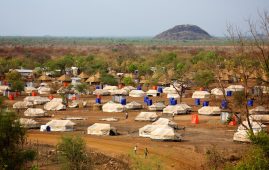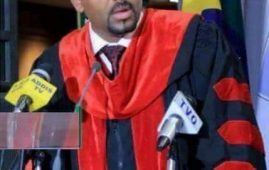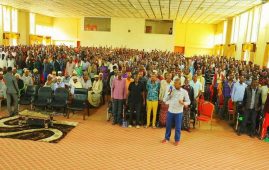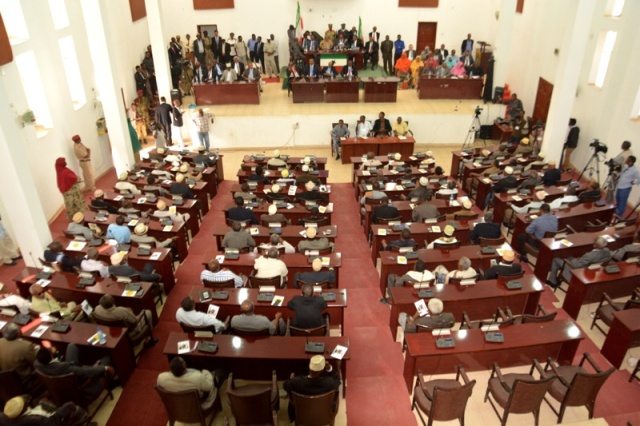Arguably, the USDS report proved its clout, albeit, in a baffling manner. It would be erroneous to relegate it ‘as worthless as the paper on which it is printed’, a favorite line of the ruling party to belittle a report. It often pushes the too-busy-to-answer government to address allegations. This year’s has succeeded to trigger a series of events, or concrete results if you like, on the Birtukan Mideksa agenda, as it was followed by acts of the government and UDJ, which I discussed on the previous posts.
Haste not, you don’t need to be anti-American or anti-Birtukan, so to speak, to be dismayed by the report.
In case you don’t know, I am referring to the statements, concerning the Birtukan Mideksa agenda, in the ‘2009 Country Reports on Human Rights and Practices’. An annual report primarily prepared ‘to comply with the congressional requirement for the reporting of human rights practices’ ‘in foreign countries and territories worldwide’, authored by the Bureau of Democracy, Human Rights, and Labor of the Department of State of USA (USDS). The 2009 report, on 194 countries, including Ethiopia was published on March 11/’10.
No time-consuming analyses are needed to show the blunders of the report, despite what you might be expecting. It makes obvious errors in at least two of its four statements on the Birtukan Mideksa agenda.
The only paragraph, of the report, dedicated to the issue, under the section of ‘political prisoners and detainees’, reads:
Opposition UDJ party president Birtukan Mideksa, whose pardon was revoked and life sentence reinstated in December 2008, remained in prison throughout the year. She was held in solitary confinement until June, despite a court ruling that indicated it was a violation of her constitutional rights. She was also denied access to visitors except for a few close family members, despite a court order granting visitor access without restrictions. There were credible reports that Birtukan’s mental health deteriorated significantly during the year. [Emphasis mine]
Labeling Birtukan as a political prisoner may be permeable to subjectivity. And, her health condition may be a matter knowable to a few. However, the last year court rulings on the legality of the solitary confinement and the denial of non-family visitors are objectively verifiable matters. The records of the Federal First Instance Court, 9th Civil Division,�proceedings on the case Birtukan vs. Federal Prison Administration are found at the public archives of the court, as well as from Birtukan’s lawyer and the then reports of several media outlets.
The court didn’t rule solitary confinement unconstitutional. To the contrary, the court dismissed the claim that her solitary confinement violates her constitutional rights. In the words of the court, ‘the constitution does not establish such a right to the plaintiff [Birtukan Mideksa]’. In other words, the constitution is silent on this matter. In fact, the court could have had criticized its duration based on the Criminal Code of Ethiopia which states that solitary confinement can be imposed for a maximum of three months at a time. Even in that event, it is a legal right not a constitutional right as the report puts it. However, that issue was not on the table.
Of course, the court rebuked the prison administration for denying her visitation by non-family members. An allegation, which the prison administration neither disproved nor provided legal basis. Hence the court ordered the prison administration to comply with the constitutional right of prisoners ‘to communicate with, and to be visited by, their spouses or partners, close relatives, friends, religious councilors, medical doctors and their legal counsel’. Yet, the court recognized the discretionary powers of the prison administration, by stating that it may determine ‘the time and manner of visitations’.
Such erroneous statements are not that surprising to those who are acquainted with previous annual reports.
So was the Previous
Similar blunders were spotted in the previous year report. The 2008 Country Reports on Human Rights Practices made unjustified criticisms the Federal High court verdict, in the case Hailu Shawel et al, on two members of the civil society. Daniel Bekele of ActionAid-Ethiopia and Netsanat Demissie of Organization for Social Justice were charged with Outrages against the Constitution or the Constitutional Order, along former CUD(KINIJIT) leaders. On Dec’07, the court acquitted them from the charges but found them guilty of a lesser charge of ‘incitement, provocation and preparation’ and sentenced them to 2 & 1/2 years of imprisonment. However, they were pardoned and released on March’08. Here is what the 2008 report had to say about the court’s verdict:
The court ultimately convicted them [Daniel & Netsanat] of incitement, a charge that had never been alleged or raised until the day of the court’s verdict, and sentenced both to 30 months imprisonment. [Emphasis mine]
This is of profound implications. It is not a criticism of some subjective aspects of the proceedings, like the weighting of evidences. The report’s allegations, if true, portray the judiciary as an organ that substitutes itself on behalf of the prosecutors, so as to create new charges and sentence the accused.
These allegations are outrageous, to say the least, as the court was in conformity with the Ethiopian Criminal Procedure Code, which has been in force since 1961. The Code commands the court to convict an accused with a lesser crime, even if she/he is found not guilty of the graver crime and the prosecutor didn’t charge him with the lesser one. Article 113(2) of the Criminal procedure of Ethiopia reads:
Where the evidence shows that the accused committed an offence with which he might have been charged in the alternative and the offence is within the jurisdiction of the court, he may be convicted of such offence notwithstanding that he was not charged with it, where such offence is of lesser gravity than the offence charged.[Emphasis mine]
This means, for example, a person accused for murder may be convicted for attempt. If the evidences show the person committed acts that can cause murder(like firing a bullet at the murdered), but do not prove whether his acts were resulted the death of the murdered person. Similarly, in this case, the court was not convinced that the two individuals tried to subvert the constitutional order, but found them guilty of with inciting, provoking the commission of such acts. It is beside the point whether one chooses to believe the court’s decision or to question it. The point is the court didn’t contravene the law by convicting them with a lesser crime, as the 2008 report insinuate.
[Suspicious of misquotation? I entreat you to make a firsthand reading of the Criminal Procedure Code(Article 113), the Criminal Code(Article 238 & 254-257) and the Human Right Reports by clicking here]
Taken aback? So is the Ethiopian government, as a brief reading of the statement of the Ministry of Foreign Affairs, issued two days after the report, suggests. In the statement, intended to make ‘general remarks’ on the report and said to be followed by ‘a rebuttal shortly after a thorough examination of those allegations which are new’, the Ethiopian government appears unclear on what to make of the report. That is, who is to blame and for what motives.
After trashing the report by stating that ‘…the report on Ethiopia, presumably as with other countries, contains the same repeated allegations, misrepresentations and tendency to use conjecture and anecdote and rely on opposition sources as well as accept groundless un-sourced allegations as plausible or even factual…’. It states two major predispositions that might have guided the preparation of the report: That is, a belief that ‘…democracy in Ethiopia can only be brought about through external efforts, and the cultivation of domestic ‘trojan horses’…’, and being ‘…naturally prone to believe all allegations about government misdeeds automatically, however wild the allegations…’
However, the Ethiopian government chose to put the blame on the authors of the report. That is the 3-5 individuals scattered from the US embassy in Addis to Washington DC. (Note that less than a thousand people were involved for the reporting, writing, and editing of the whole report, covering 194 countries). The government accused the authors for deliberately ignoring the facts, while describing the report as a demonstration of serious intellectual deficiencies and flaws.
In short, it appears the statement was intended to express outrage but indecisive on who to blame and what motives to allege. As the US government is its firm ally and the authors are unlikely to lack publicly available documents like Ethiopian laws or records of Judicial rulings.
Perhaps, no need to engage in tiresome speculations, as the answer is right there at the introductory section of the report. The report declares in black and white its intention to amplify the voices of ‘change agents’. It reads:
A third element is our belief that although foreign governments and global civil society cannot impose change from outside, we can and should encourage and provide support to members of local civil society and other peaceful change agents within each country. As part of such efforts, these reports can and often do amplify these voices, by making reference to their findings, publicly reinforcing their concerns, and by widely disseminating this information to opinion makers, both internationally and within affected countries.[Emphasis mine]
What a better way could there be to amplify someone’s voice than to give its allegations an official status? Then after, the complainant, who is also the source of the report, can cite the report as evidence.
Having this in mind, one may justifiable wonder whether the statements about Birtukan’s health are simply ‘amplified’.
What about Credibility?
The authors of the report may be deemed to be serving US interest. It may be in the interest of their country to show sympathy for dissenters as a contingency plan. These reports may make it to the Oval office if and when the two governments run out of favor. Thus, the making of this year’s report may be judged wise if and when Birtukan is released and with feelings of indebtedness to the USA.
However, such a blunder is dismaying to those of us who would like to esteem the United States as a principled nation and its institutions and reports as reliable.
******************
WORDS ABOUT WORDS
This is the end of the series titled ‘Betting on Birtukan Mideksa’.
Note that: It is not about the deeds or decisions of W/t Birtukan Mideksa herself rather with what the three ‘stakeholders’ of the Birtukan Mideksa agenda, apparently, intend to gain from the issue.
Neither the grounds for the revocation of her pardon, nor the manner in which it took place are dealt with in this article, though you are entitled to make assumptions regarding my position on those issues.
Having this in mind, I entreat you to re-read the previous posts and to give me feed back, either by commenting thereunder or via e-mail:
- Betting on Birtukan Mideksa–I with regard to the Ethiopian government
- UDJ’s Media Circus (Betting on Birtukan Mideksa-II) with regard to UDJ, aka ANDINET, party





![Photo - Muse Bihi, Ahmed Silanyo and Dahir Riyale, the new president and his predecessors [Photo - Muse Jeeh]](https://hornaffairs.com/wana/wp-content/uploads/2017/12/Photo-Muse-Bihi-Ahmed-Silanyo-and-Dahir-Riyale-the-new-president-and-his-predecessors-Photo-Muse-Jeeh-269x170.jpg)
